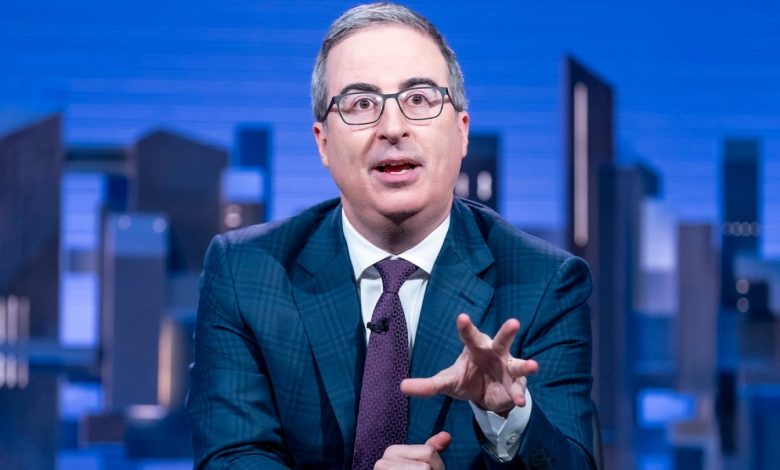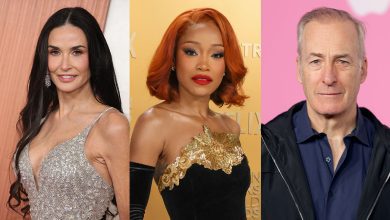John Oliver Talks Legal Battles, Late Night Turmoil and Clapping Back at His Owners

John Oliver may delight in biting the corporate hand that feeds him — “there’s no tastier hand,” he insists — but he is deeply grateful for his perch. With his pal Stephen Colbert’s Late Show recently canceled amid financial losses to the tune of tens of millions a year and a pending multibillion-dollar merger at its parent company, Oliver’s Last Week Tonight finds itself ensconced in its premium cable/streaming corner at HBO, where it tackles complicated, often uncomfortable subjects such as immigration, policing and juvenile justice.
Still, Oliver is adamant that it’s the show’s bevy of awards — 30 Emmys and counting — that has kept it on the air and without interference for 12 seasons. Come September, it will vie for six more, including outstanding scripted variety series. Zooming from Last Week Tonight’s Manhattan offices in late July, Oliver weighed in on his battles with legal, his concerns for late night and his desired level of anxiety.
Last Week Tonight segments come together in six weeks. When in that timeline does the comedy get layered in?
Really late. The jokes used to come in earlier, but you don’t want to start writing before a story is stable because then you’ll fall in love with jokes that are built on material that doesn’t stand up, and that’s a terrible position to put comedy writers in. So, it’s only in the last two weeks that the jokes come in. But in that first month, you’re trying to give people ingredients that they’ll be able to create comedy from. You want it to be like an episode of Chopped, where it’s not impossible to make something palatable at the end. So, you’re not giving them broken glass and weed killer. You’ll give them eggs.
When was last time a Last Week segment made you genuinely anxious?
I mean, there’s always a low-level anxiety with every story. I’d argue a healthy level of anxiety. And it’s only ever about whether people are going to be willing to listen to us talk about something, because it’s so superficially dry or contentious that you’re not sure if it’s something people will want to hear, and then you’re practicing force-feeding. But that’s part of the joy of having this show — the ability to show people things they might not necessarily think, on their face, they want to see. I mean, just a few weeks ago, we did a long piece on juvenile justice, and that’s the kind of story where you think, “I’m not sure people want to hear this,” but I am sure that it’s the absolute point of having a show like this.
From the Emmy stage, you thanked HBO and “our lawyers, who are angry with us all the time.” What is that push and pull like?
They are our final line of defense, so it has to be a functional relationship, but it can be fraught, especially toward the end. The general tension that we land on is having a slightly different view of their job. They think it’s to stop us from getting sued, and I think it’s to make sure that when we are sued, we win. So, yeah, I’m half-joking when I say it’s a fraught relationship. It’s an important process for the script to go through, but it can be not infrequently tense.
I can imagine.
But you also don’t get to be angry at the lifesaving device. (Laughs.)
You’ve had a revolving door of corporate owners. Is interference something you’ve either experienced or worry about?
We’ve not experienced interference, and I refuse to worry about something that hasn’t happened yet. My tolerance level, were it to, would be zero. This would be over real quick.
Put another way, is there a “there but for the grace of God go I” aspect to what appears to have happened with Colbert and his show?
We are fortunate enough to be in a very different situation than network commercial TV, so those corporate pressures are not comparable, and we have no pressures from advertisers.
Presumably you saw the shots of Warner Bros. Discovery CEO David Zaslav palling around with Ivanka Trump in Sun Valley. What goes through your mind when you see something like that?
I try to pay as little attention to what is happening outside of our show as possible because it feels like wasted energy. The moment that intrudes on our show, I will react very badly to it, but it hasn’t. So, yeah, I try not to get angry about things that aren’t happening to us.
At the same time, you seem to bite the hand that feeds you with regularity and some degree of glee …
There’s no tastier hand!
I was watching the segment that you did a few months ago about Trump and the media, and at one point, you just started railing against your corporate parent and the idiocy of the HBO Max name changes. Again, seemingly with glee. Did you hear from anyone afterward?
No. And you’re right, I’m truly happy in those moments. That’s probably the most at peace I am, when I’m trying to draw fire from our owners.
Should we unpack that? What does that say about you?
I don’t know, and I refuse to turn this into a therapy session. (Laughs.) But I always used to love watching David Letterman do it. To me, it felt like a really healthy sign of contempt and just a very fun and slightly important indication of noncompliance. So, I loved it when he’d make fun of G.E. and CBS and, yeah, for me, making fun of whoever owns us on a minute-to-minute basis is a thrill.
You grew up on Letterman. Do you worry about the future of late night TV?
On network TV? Yeah, it’s constantly evolving. What’s happened to The Late Show is incredibly sad for comedy and, obviously, for the staff in that building. It really resonated with me when Stephen said he was hoping to hand this show over to someone else. You hope that the franchise lives on partly because there are generations of teenagers watching those shows and deciding, “Maybe I’d like to be a comedy writer,” and then maybe writing on that show. So, just as there are Colbert writers that watched Letterman, there will be future writers that watched Colbert, and you want that to continue. I’m sure it’ll find a way to exist in some form, we just don’t yet know exactly what that’s going to look like for network television.
You’ve had success having a point of view on your show, as Colbert has, at least in the ratings. Late night used to be broad, unifying entertainment. I know Jay Leno recently spoke on this topic, about making a show for everyone …
I’m going to take a hard pass on taking comedic advice from Jay Leno.
Fair enough, but should these shows still try to be for everyone, or is that as antiquated as the tanning bed?
Who thinks that way? Executives? Comedy can’t be for everyone. It’s inherently subjective. So, yeah, when you do stand-up, some people try to play to a broader audience, which is completely legitimate. Others decide not to, which is equally legitimate. I guess I don’t think it’s a question of what you should do because I don’t think comedy is prescriptive in that way. It’s just what people want. I think our show clearly comes from a point of view, but most of those long stories we do are not party political. They’re about systemic issues. Our last few shows were about gang databases, AI slop, juvenile justice, med spas, air traffic control. I’m not saying that these don’t have a point of view in them. Of course they do. But I hope a lot of them actually reach across people’s political persuasions. You want people to at least be able to agree on the problem, even if you disagree on what the solution to it is.
As someone who’s found a version of a late night show that succeeds on streaming, do you think it’s replicable and, if so, what should it look like?
I have absolutely no idea. [Late New York Times media columnist] David Carr said something so nice at the end of our first year. He’d liked our show, and he said to me, “If you had described this show to me before I saw it, I would’ve said it sounded terrible.” It was so honest; I’ve never forgotten it. Because I don’t think, on the page, our show sounds very good. I mean, we’re doing, like, 40 minutes on juvenile justice.
It doesn’t exactly scream commercial.
No, it doesn’t. So I don’t know that you can emulate this success. I think it might’ve been a mistake or a lightning strike. I just don’t know that this is scalable. But I’d really like late night to exist in some form somewhere. My favorite thing is when you can have things that both have a strong point of view and are incredibly stupid. Seth [Meyers], last week, did some great shows, and he also did an amazing segment about how to pronounce “croissant.” Did you see that? It was so good. It was the hardest I laughed all week. So, I love the fact that those things can coexist, and I don’t want that to go away.
The camaraderie that the late night hosts have now is so vastly different from the environment you grew up with.
Well, the stakes are just lower now. There’s no point being in a war. You’re not fighting over any meaningful territory. (Laughs.)
Many of you came on Colbert’s show on July 21, appearing in a Coldplay kiss-cam spoof, shortly after the news of his cancellation. What did that outreach look like?
Well, we’ve been in contact as a group since the strike [several of them hosted a podcast, Strike Force Five], so as soon as the news broke, we were all checking in with Stephen in that chat and then he came up with the idea and asked us to come, and of course we’re all going to do it. You want to be able to support him and his staff in a horrible, horrible time.
I did appreciate just how much everyone sort of played into their brand while sitting there, down to Anderson Cooper looking fairly uncomfortable.
Anderson was almost emitting a sense of, “Why am I here?” A legitimate question!
Back to your show. Amid all the bleakness, you and your writers decided to give yourselves this ambitious side project, rebranding a minor league baseball team the Erie Moon Mammoths. How much pressure did you feel to make sure that was something that could produce actual civic pride, rather than simply five funny minutes on HBO?
The reason we first started talking about it is that we were doing a show about deportations — so, monumentally bleak — and it felt like an example of when you’ve had a kale-based meal, it’s nice to serve something resembling a dessert at the end of it. One of our writers, Charlie, he pitched this story about minor league baseball and just how eccentric and, in many ways, life affirming it is, and we had the idea at the end of that to issue this offer [to have Last Week Tonight have carte blanche to rebrand a team]. We thought someone might take our offer, but we weren’t sure. So, if it was just that and no one offered, that was fine. Once it became clear that people were really interested, then it felt like it might be something that could spin us out of a bunch of very dense, dark stories. Then you want to execute it as well as you possibly can. You don’t want it to be a drive-by joke at the place you’re picking. You want to pick a place that can handle it but also needs it.
It became a feel-good story at a time when we so desperately need a feel-good story.
I know. It is odd the extent to which it repaired some of my faith in human nature, and that is a very weird thing to find yourself saying when you’re standing next to a seven-foot purple mammoth.
Speaking of happy endings, earlier this year, HBO let you return to releasing full segments of your show on YouTube the day after airing. What changed?
I think they wanted to see if moving it back on YouTube had an effect on our ratings. I didn’t think it would, which is why I was against moving it in the first place. And I was massively grateful that, upon looking at it, they realized it wasn’t having a negative enough effect to be worth doing. Again, in the difficulty of the media environment that we’re in, I try to be as cognizant as I can be that HBO is still a fantastic place to work.
And yet you make a lot of jokes about how all these Emmys are your show’s only armor against getting canceled.
I mean, two things can be true at the same time. (Laughs.) It’s a fantastic place to work while we are insulated by golden armor. If that stops, we might be going away.
Do you genuinely believe that?
It’s not entirely a joke, that’s for sure. I think it is objectively very, very helpful to have won Emmys with the show. I think it has helped us keep our independence and keep the show on the air. So, yeah, I do think there is a utility to it. It’s something that I know has always been important to HBO, and so I’m massively grateful that we’ve won them, and long may that continue. Please! I don’t want my theory tested.
This story appeared in the Aug. 6 issue of The Hollywood Reporter magazine. Click here to subscribe.
Source: Hollywoodreporter
HiCelebNews online magazine publishes interesting content every day in the TV section of the entertainment category. Follow us to read the latest news.
Related Posts
- ‘Star Wars: A New Hope’ Will Return to Theaters in 2027 to Honor 50th Anniversary
- 'Weapons'
Courtesy of Warner Bros.
Share on Facebook
…
- BAFTA Unveils Tweaks to Voting Rules for Television and TV Craft Awards, Sets 2026 Dates
- Rose McGowan Found Happiness “Talking to Trees” in Mexico and Has Emerged With New Creative Fire
- Sean “Diddy” Combs Denied Release From Jail Until Sentencing





